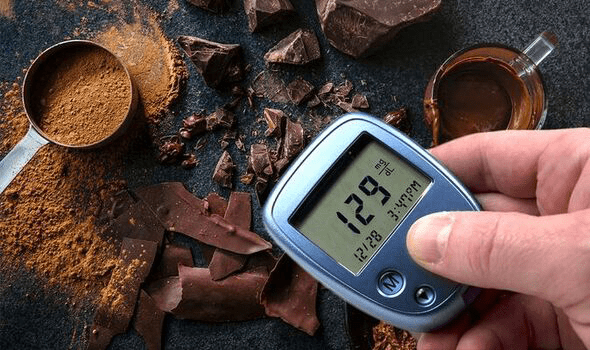Should Diabetics Eat Chocolate?
Let’s clear this up: if you have diabetes, chocolate isn’t off-limits. Surprised? You’re not alone! While it’s true that chocolate is often associated with sugary indulgence, there’s room for it in a balanced diet—as long as you’re mindful of what, how much, and when you eat it.

The Sweet Truth About Chocolate and Diabetes
According to ‘Diabetes UK’, chocolate can be enjoyed in moderation, but there are some important things to keep in mind. Regular chocolate is high in sugar and saturated fats, so eating too much can cause blood sugar spikes and make weight management harder. And don’t be tempted by “diabetic” chocolate – these products are expensive, often taste odd, and can contain sweeteners that upset your stomach and have a laxative effect.
We should all limit our free sugar intake to 30g a day for adults and children over the age of 11, equal to 7 cubes or 7 teaspoons of sugar. This is especially important for people living with diabetes, who are at higher risk of dental problems.
Commercially available chocolate for the ‘high street’ supermarket typically contains cocoa mass, cocoa butter and additional fats or oils like palm oil and shea butter, together with sweeteners. These ingredients are high in saturated fats, linked to raised cholesterol and heart disease. You can check how much chocolate treats can add up to by checking your foo labels.
But here’s the good news: you don’t have to avoid chocolate completely. You just need to choose wisely.
For simplicity, chocolates from us at ‘Hello Chocolat’ (and many chocolates made by artisans) contain only cocoa mass, cocoa butter, sugar and emulsifier.
Why Dark Chocolate Can Be a Smart Choice
If you’re a chocolate lover, dark chocolate could be your new best friend. Why? Because it has a higher cocoa content and less sugar than milk or white chocolate, making it a better option for people with diabetes.
Experts, including those at ‘Abbott’, point out that cocoa is rich in flavonoids – plant-based compounds with antioxidant properties. Some studies suggest that these flavonoids may improve insulin sensitivity, reduce inflammation, and even help with blood sugar control. That’s why dark chocolate, when enjoyed in small amounts, can be a delicious and potentially beneficial treat.

Even ‘Everyday Health’ highlights dark chocolate as one of the best desserts for diabetics. They recommend looking for bars with at least 70% cocoa content. These are less sweet but offer a rich flavour and plenty of antioxidants. Plus, because dark chocolate is so satisfying, you’re less likely to overeat it!
Tips for Enjoying Chocolate Wisely
Here are a few tips to make chocolate part of your diabetes-friendly lifestyle:
- Keep It Small: A little goes a long way. A square or two of dark chocolate can satisfy your sweet tooth without wreaking havoc on your blood sugar.
- Pair It Up: Try pairing chocolate with high-fibre foods like nuts or berries. The fibre can help slow down sugar absorption.
- Read Labels: Choose chocolate with minimal added sugars and a high cocoa percentage. The closer it is to pure cocoa, the better.
- Monitor Your Blood Sugar: Pay attention to how chocolate affects your blood sugar levels, especially if you’re trying a new type or brand.

The Bottom Line
Yes, you can enjoy chocolate with diabetes – it’s all about moderation and smart choices. Dark chocolate, in particular, can even offer some health benefits thanks to its antioxidants. So, don’t feel like you have to swear off this treat forever. With a little planning, you can savour the sweetness without compromising your health.
Now, isn’t that sweet news?
references:
https://www.diabetes.org.uk/living-with-diabetes/eating/chocolate-and-diabetes
https://www.abbott.com/corpnewsroom/diabetes-care/dark-chocolate-and-diabetes.html
https://www.everydayhealth.com/type-2-diabetes/diet/why-dark-chocolate-one-best-desserts-diabetics/
